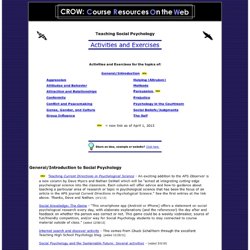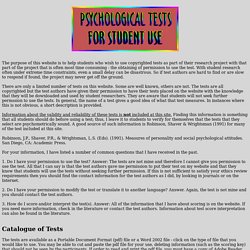

Selective attention test. Science & Nature - Human Body and Mind - Spot The Fake Smile. Social psychology final exam. The Similarities Project. By Peter Kaufman We all need food.

We all need water. We all need air. We all have parents. We all have organs. Laugh. These are just some of the responses that were generated last month when I took a group of college students to participate in The Similarities Project with a class of third graders. The purpose of the visit was to explore (and eventually draw) some of the similarities between these two groups of students. The c hallenge of finding things we have in common is not only difficult when we bring together two disparate groups; it is sometimes difficult when we are among our peers.
Mes more difficult to find things they all share. The Similarities Project demonstrates the extent to which we are socialized to focus much more on our differences than our commonalties. But t oo often, our emphasis on differences impoverishes instead of enriches our lives. If y. Activities and Exercises: Social Psychology. Beyond the Purchase - Here's an intriguing new website developed by a few psychologists: "Our basic message is that at BeyondThePurchase.org you can take short surveys and quizzes to receive personalized feedback about your spending habits, happiness, and values...Our goal at Beyond The Purchase is to: (1) educate people about their spending habits, what impacts their financial decisions, and the costs and benefits of specific consumer choices (i.e., introducing the public to consumer research and the psychology of money).

People can learn about how they spend their money and the psychological variables (e.g., their development, personality, motivation, values, beliefs, forecasts, and community) that influence these choices. (2) disseminate scientific knowledge about how and why people spend their money in different ways (i.e., contributing to consumer psychology). The Monty Hall problem - Here's another online demo where students can play the game and keep track of the results. Psychological Tests for Student Use. The purpose of this website is to help students who wish to use copyrighted tests as part of their research project with that part of the project that is often most time consuming - the obtaining of permission to use the test.

With student research often under extreme time constraints, even a small delay can be disastrous. So if test authors are hard to find or are slow to respond if found, the project may never get off the ground. There are only a limited number of tests on this website. Some are well known, others are not. The tests are all copyrighted but the test authors have given their permission to have their tests placed on the website with the knowledge that they will be downloaded and used by student researchers. Information about the validity and reliability of these tests is not included at this site. Robinson, J.P., Shaver, P.R., & Wrightsman, L.S. As of May 2013, I will not be monitoring this website and will not respond to questions about the tests or the website.
Essay Questions. At the final exam, you will receive a short single experiment article to read.

With the exception of question 9, the same exam questions are used each year. (Question 9 depends on the particular results of the study, but always deals with the results section). 1.What are the dependent variables? What are the dependent variables at the construct or theoretical level? How have they been operationalized? SOCIAL PSYCHOLOGY - CHAPTER QUIZZES - MAIN LIST. Self-Quiz on Social Psychology. Back to Self-Quiz Index Back to Psych Web Home Page Revised 4/4/2004.

Welcome to the self-quiz on Social Psychology. Read the question and click on an answer. You will jump to a correction or (if the answer is correct) a confirmation. End of multiple choice questions for Chapter 16 This page is To the Psych Web Home Page Top of this file To the Self-Quiz Home Page You picked... he was "shunned" No, the subjects in the Asch conformity experiment did not interact in this way. back to questions the group was more likely to vote to punish him No, the subjects in the Asch experiment were not asked to do anything to each other. other subjects tried to persuade him No, in the Asch experiment every subject had a free choice. it actually strengthened the beliefs of other subjects No, the "other subjects" were confederates of the experimenter, so they didn’t have any false beliefs; they knew what they were doing. most subjects were "freed" from the conformity effect indifferent toward calmly curious about.